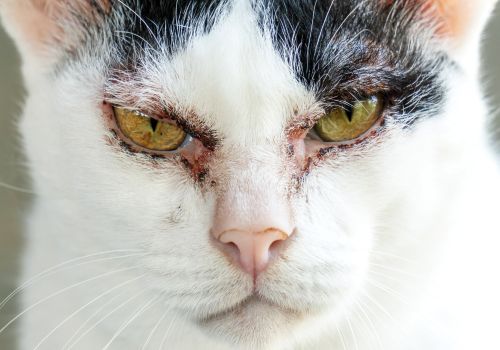
Many people talk about humans being allergic to cats but don’t think about the fact that cats, themselves, can have allergies. If you’ve been up all night recently with a cat that’s incessantly itching, you surely know it’s true. And perhaps you’ve turned to the internet for answers. While Google is great for many things, at Main Street Veterinary Hospital, we believe pet care information should come straight from your vet, and we work diligently to bring you the accurate information you need. To avoid the misinformation that is out in the ether, we’ve taken frequently asked questions on cat allergies and answered them as thoroughly and accurately as possible to ensure you have the facts. Although you can trust the information below, we always urge you to consult your own veterinarian on critical pet issues.
If you’re looking for a highly trained veterinarian in Norman, OK, we’d love to see your cat to get them relief from whatever allergies are ailing them, so please call us at (405) 329-6555.
What are some common cat allergies?
The most common cat allergy is a flea allergy. Even though your cat may be indoor-only, they can still have contact with fleas from the clothes you wear. If you have a dog that goes outside, the cat can also be exposed that way. There are also food allergies, and then there are environmental allergies from exposure to dust mites, pollens, and other things like that.

How do allergies impact the health and well-being of my cat?
Allergies play a large part in the overall well-being of your cat. They may have asthma, so they may not even be able to breathe well if they do come into contact with these allergies. Allergies in cats can also cause skin issues, so they'll be uncomfortable due to the scratching and irritation. Cats with allergies may even have some GI issues, including diarrhea or vomiting. Allergies play a significant role in the problems we see in our cats.
What are some signs and symptoms that my cat may have allergies?
As with any illness or condition, the symptoms of cat allergies vary from pet to pet.
Some symptoms of cat allergies are:
- Scratching at the offending area, often paws
- Diarrhea or Vomiting
- Hair loss
- Ear infections
As the Pet Health Network notes, sometimes cats with allergies even snore due to an inflamed throat.
Why is it important to avoid self-diagnosing allergies in my cat?
It's imperative not to self-diagnose because a lot of other issues can mimic the signs of allergies. So your cat could have something like an underlying endocrine disorder or another condition. We want to make sure it is allergies first before treating and going down that route. And as we all know, cats are stoic creatures who are masters at masking their pain so that self-diagnosing could extend the discomfort of your cat.
How will a veterinarian diagnose whether or not my cat has allergies?
Veterinarians will likely do different tests to diagnose allergies in your cat based on the way your pet presents.
Some of the things veterinarians may do to diagnose allergies in your cat are:
- Skin tests
- A skin cytology
- A skin scraping to get an idea of what's going on with your cat’s skin
- An ear examination to figure out what allergies your cat is experiencing

What types of treatments can be used to relieve the symptoms of a cat that is suffering from allergies?
There are many different treatments, including injectable antibiotics, steroids, and oral medication. It all depends on what type of allergies your veterinarian identifies when determining what treatment path we go down. That’s why it's essential to avoid self-diagnosing and to bring your cat in so we can figure out exactly which treatment we should choose.
How effective are treatments for cats suffering from allergies?
Once we identify the issue, the treatment path that we choose effectively treats that particular allergy. It’s essential to bring your cat to the vet to figure out which type of allergy it is and base the treatment accordingly.
If you have further questions about cat allergies, reach out to your veterinarian. If you live in or near Norman, OK, we’d love to see your cat and get them back on the path to wellness, so please don’t hesitate to call us at 405-329-6555 or email us at [email protected].

